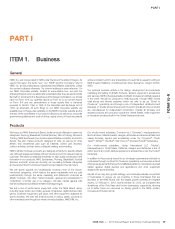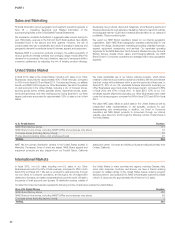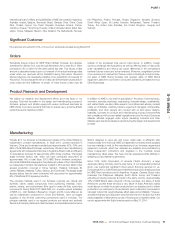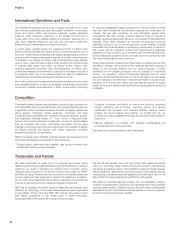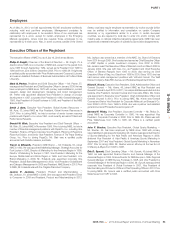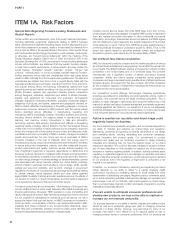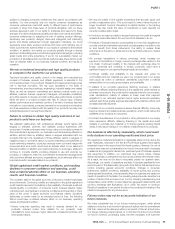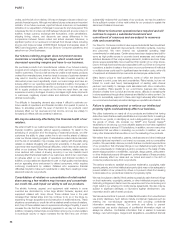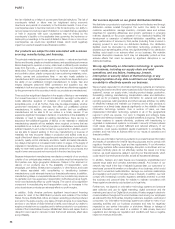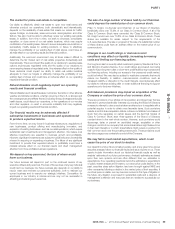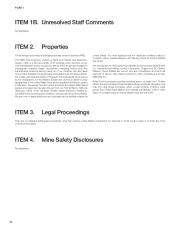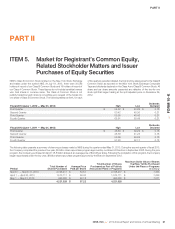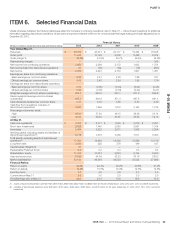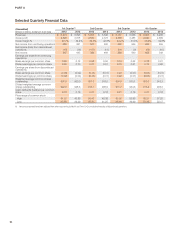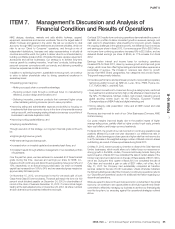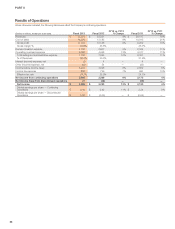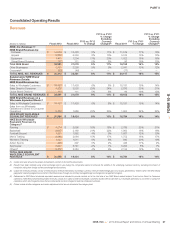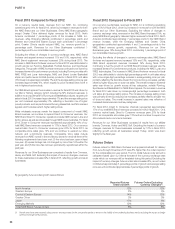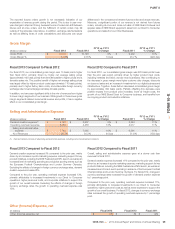Nike 2013 Annual Report Download - page 14
Download and view the complete annual report
Please find page 14 of the 2013 Nike annual report below. You can navigate through the pages in the report by either clicking on the pages listed below, or by using the keyword search tool below to find specific information within the annual report.
PART I
The market for prime real estate is competitive.
Our ability to effectively obtain real estate to open new retail stores and
otherwise conduct our operations, both domestically and internationally,
depends on the availability of real estate that meets our criteria for traffic,
square footage, co-tenancies, lease economics, demographics, and other
factors. We also must be able to effectively renew our existing real estate
leases. In addition, from time to time, we seek to downsize, consolidate,
reposition, or close some of our real estate locations, which may require
modification of an existing lease. Failure to secure adequate new locations or
successfully modify leases for existing locations, or failure to effectively
manage the profitability of our existing fleet of retail stores, could have an
adverse effect on our operating results and financial condition.
Additionally, the economic environment may at times make it difficult to
determine the fair market rent of real estate properties domestically and
internationally. This could impact the quality of our decisions to exercise lease
options at previously negotiated rents and the quality of our decisions to
renew expiring leases at negotiated rents. Any adverse effect on the quality of
these decisions could impact our ability to retain real estate locations
adequate to meet our targets or efficiently manage the profitability of our
existing fleet of stores and could have an adverse effect on our operating
results and financial condition.
Natural disasters could negatively impact our operating
results and financial condition.
Natural disasters such as earthquakes, hurricanes, tsunamis or other adverse
weather and climate conditions, whether occurring in the U.S. or abroad, and
the consequences and effects thereof, including energy shortages and public
health issues, could disrupt our operations, or the operations of our vendors
and other suppliers, or result in economic instability that may negatively
impact our operating results and financial condition.
Our financial results may be adversely affected if
substantial investments in businesses and operations fail
to produce expected returns.
From time to time, we may invest in business infrastructure, acquisitions of
new businesses, product offering and manufacturing innovation, and
expansion of existing businesses, such as our retail operations, which require
substantial cash investments and management attention. We believe cost
effective investments are essential to business growth and profitability.
However, significant investments are subject to typical risks and uncertainties
inherent in acquiring or expanding a business. The failure of any significant
investment to provide their expected returns or profitability could have a
material adverse effect on our financial results and divert management
attention from more profitable business operations.
We depend on key personnel, the loss of whom would
harm our business.
Our future success will depend in part on the continued service of key
executive officers and personnel. The loss of the services of any key individual
could harm our business. Our future success also depends on our ability to
recruit, retain and motivate our personnel sufficiently, both to maintain our
current business and to execute our strategic initiatives. Competition for
employees in our industry is intense and we may not be successful in
attracting and retaining such personnel.
The sale of a large number of shares held by our Chairman
could depress the market price of our common stock.
Philip H. Knight, Co-founder and Chairman of our Board of Directors,
beneficially owns over 75.6% of our Class A Common Stock. If all of his
Class A Common Stock were converted into Class B Common Stock,
Mr. Knight would own over 15.8% of our Class B Common Stock. These
shares are available for resale, subject to the requirements of the
U.S. securities laws. The sale or prospect of the sale of a substantial number
of these shares could have an adverse effect on the market price of our
common stock.
Changes in our credit ratings or macroeconomic
conditions may affect our liquidity, increasing borrowing
costs and limiting our financing options.
Our long-term debt is currently rated investment grade by Standard & Poor’s
and Moody’s Investors Service. If our credit ratings are lowered, borrowing
costs for future long-term debt or short-term credit facilities may increase and
our financing options, including our access to the unsecured credit market,
could be limited. We may also be subject to restrictive covenants that would
reduce our flexibility. In addition, macroeconomic conditions, such as
increased volatility or disruption in the credit markets, could adversely affect
our ability to refinance existing debt or obtain additional financing to support
operations or to fund new initiatives.
Anti-takeover provisions may impair an acquisition of the
Company or reduce the price of our common stock.
There are provisions of our articles of incorporation and Oregon law that are
intended to protect shareholder interests by providing the Board of Directors
a means to attempt to deny coercive takeover attempts or to negotiate with a
potential acquirer in order to obtain more favorable terms. Such provisions
include a control share acquisition statute, a freeze-out statute, two classes of
stock that vote separately on certain issues, and the fact that holders of
Class A Common Stock elect three-quarters of the Board of Directors
rounded down to the next whole number. However, such provisions could
discourage, delay or prevent an unsolicited merger, acquisition or other
change in control of our company that some shareholders might believe to be
in their best interests or in which shareholders might receive a premium for
their common stock over the prevailing market price. These provisions could
also discourage proxy contests for control of the Company.
We may fail to meet market expectations, which could
cause the price of our stock to decline.
Our Class B Common Stock is traded publicly, and at any given time various
securities analysts follow our financial results and issue reports on us. These
reports include information about our historical financial results as well as
analysts’ estimates of our future performance. Analysts’ estimates are based
upon their own opinions and are often different from our estimates or
expectations. If our operating results are below the estimates or expectations
of public market analysts and investors, our stock price could decline. In the
past, securities class action litigation has been brought against NIKE and
other companies following a decline in the market price of their securities. If
our stock price is volatile, we may become involved in this type of litigation in
the future. Any litigation could result in substantial costs and a diversion of
management’s attention and resources that are needed to successfully run
our business.
NIKE, INC. 2013 Annual Report and Notice of Annual Meeting 59
FORM 10-K


